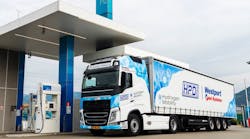Westport unveils hydrogen fuel system for heavy-duty ICE applications
Westport Fuel Systems Inc.'s new hydrogen HPDI fuel system technology enables heavy-duty trucks to operate on biomethane (renewable natural gas) and natural gas with the same power, torque, efficiency, and performance as diesel engines, the company stated recently.
The H2 HPDI fuel system is integrated into a fully functional demo vehicle and was displayed during the 2022 ACT Expo in Long Beach. The H2 HPDI fuel system delivers, tank to tailpipe, up to 98% CO2 reduction over diesel, the company said.
See also: Cummins, Freightliner partner on hydrogen fuel-cell truck
H2 HPDI engine specifications:
- Power and torque: 20% higher power and torque than the base diesel engine
- Efficiency: 5%-10% better thermal efficiency than the base diesel engine
- Turbocharged 13-liter inline six-cylinder engine
- Fuel: Hydrogen, with pilot ignition
- Four-cycle, compression ignition, direct injection
The HPDI fuel system technology uses compression ignition combustion with the overwhelming majority of the energy derived from the combustion of, typically, a gaseous fuel. Combustion is initiated via late cycle direct injection of a small quantity of pilot fuel, followed by direct injection of the primary gaseous fuel; both fuels are injected via a proprietary dual concentric needle injector design. By utilizing diesel-cycle thermodynamics, the HPDI fuel system retains the thermal efficiency, power, torque, and engine braking of the base diesel internal combustion engine, the company stated.
Check out the following video of Westport Fuel Systems’ HPDI 2.0 natural gas versus hydrogen test:




